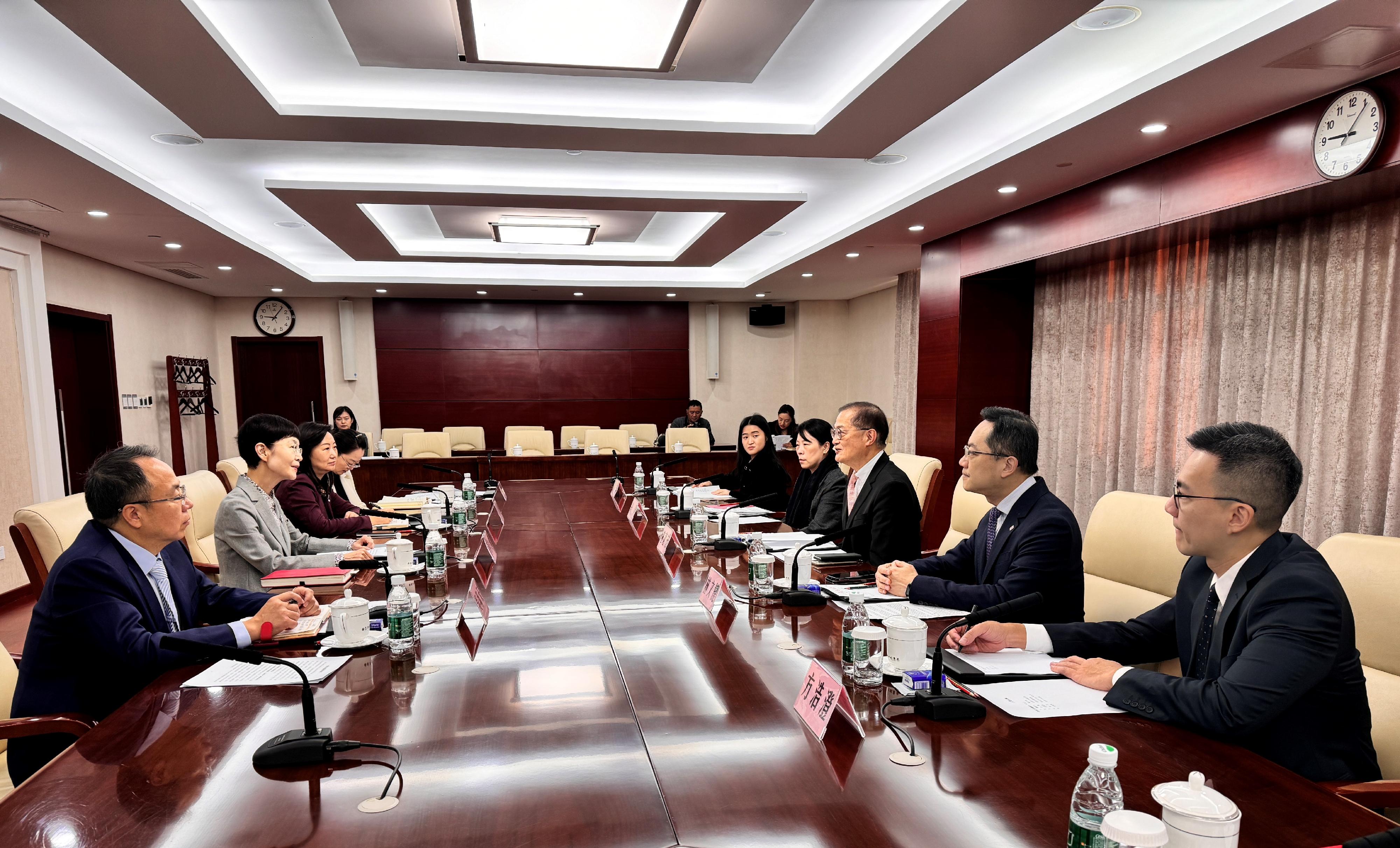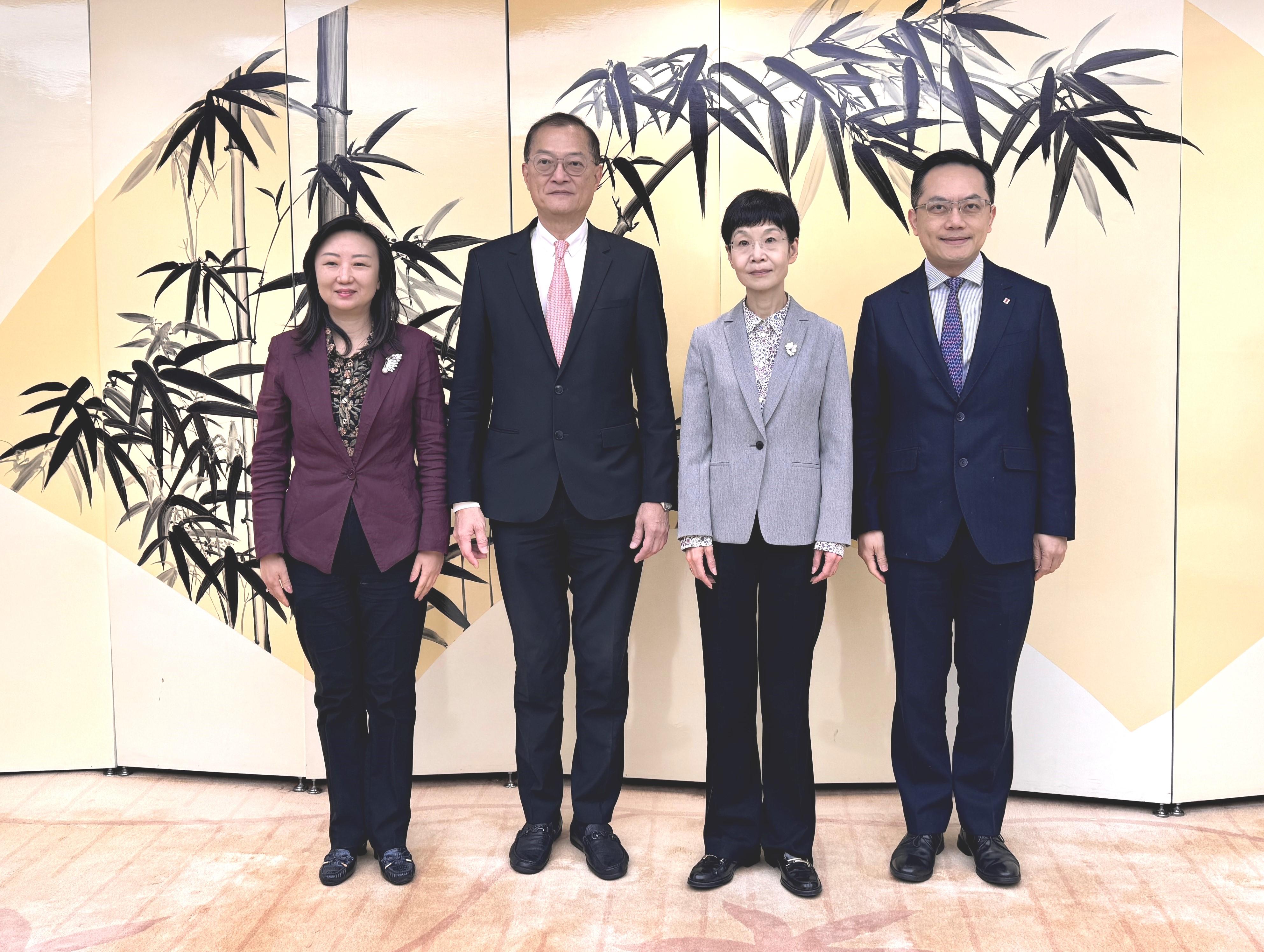Secretary for Health meets Vice-minister of National Health Commission in Beijing (with photos)
​The Secretary for Health, Professor Lo Chung-mau, met with Vice-minister of the National Health Commission Ms Guo Yanhong in Beijing today (December 4) to introduce multiple initiatives to develop Hong Kong into an international health and medical innovation hub and deepen the reform of the healthcare system as set out in “The Chief Executive’s 2024 Policy Address”. They also engaged in in-depth discussions on the latest situation and measures of tobacco control in Hong Kong.
Professor Lo said, “In the Resolution of the Communist Party of China (CPC) Central Committee on Further Deepening Reform Comprehensively to Advance Chinese Modernization adopted by the Third Plenary Session of the 20th CPC Central Committee, it mentions the further reform of the medical and healthcare systems, and support for the development of innovative drugs and medical devices. The Development Plan for Shenzhen Park of Hetao Shenzhen-Hong Kong Science and Technology Innovation Co-operation Zone (Development Plan for Shenzhen Park) promulgated by the State Council in August last year put forward the co-ordinated development of ‘one zone, two parks’ between Shenzhen and Hong Kong, expressing clear support for the innovative application of advanced biomedicine technologies. The Hong Kong Special Administrative Region (HKSAR) Government is determined to leverage the advantages of the ‘one country, two systems’ principle and Hong Kong’s healthcare professional system to develop Hong Kong into an international health and medical innovation hub to expedite patients’ access to advanced diagnostic and treatment services, and promote the development of the biomedicine research and development industry, while actively integrating into the national development by showing support for fostering new quality productive forces in biomedicine technologies, as set out in the Resolution and the Development Plan for Shenzhen Park.
“Established and wholly owned by the HKSAR Government, the Greater Bay Area International Clinical Trial Institute was officially opened in the Hong Kong Park of the Hetao Shenzhen-Hong Kong Science and Technology Innovation Co-operation Zone (HTCZ) last month. The Greater Bay Area International Clinical Trials Center of the Shenzhen Municipality was also opened in the Shenzhen Park on the same day. The establishment of ‘one institute, one center’ marked the first benchmark for co-ordinated development under ‘one zone, two parks’ of the HTCZ.”
In terms of deepening reform of the healthcare system, Professor Lo emphasised that the reform seeks to improve healthcare protection and quality, as well as to strengthen the sustainability of the public healthcare system, with a view to enhancing citizens’ health.
Professor Lo said, “The HKSAR Government will continue improving public healthcare services, scaling up medical collaboration in the Guangdong-Hong Kong-Macao Greater Bay Area and exploring the setting up of a standing organ transplant mutual assistance mechanism, with a view to helping to uphold the global standing and regional advantage of Hong Kong’s healthcare professions.”
During the meeting, the Director of Health, Dr Ronald Lam, introduced to Ms Guo the utilisation of acupuncture in supporting smoking cessation by the Department of Health (DH). They also engaged in in-depth discussions on the latest situation and measures of tobacco control in Hong Kong.
Professor Lo fully concurred with the ban on selling flavoured e-cigarettes on the Mainland, noting that flavoured cigarettes do pose tremendous adverse impacts on citizens, teenagers and women in particular.
Professor Lo is leading a delegation to attend the 2024 World Conference on Traditional Medicine in Beijing. Members of the delegation include Dr Lam; the Commissioner for Chinese Medicine Development of the Health Bureau (HHB), Dr Vincent Chung; the Head of the Tobacco and Alcohol Control Office of the DH, Dr Fung Ying; the Assistant Director of Health (Chinese Medicine), Dr Edmund Fong; the Chairman of the Hospital Authority (HA), Mr Henry Fan; the Chief Executive of the HA, Dr Tony Ko; as well as officials of the HHB, the DH and the HA. The Hospital Chief Executive of the Chinese Medicine Hospital of Hong Kong, Professor Bian Zhaoxiang, also joined the delegation for the conference. Professor Lo will return to Hong Kong this afternoon.



